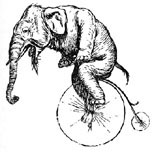
The Shaky Foundations of the Jesus Seminar
ON THE AUTHENTICITY OF ST. MATTHEW'S GOSPEL
A counter-revolution in biblical scholarship, as it refers to the Gospels, is waiting to happen. The reason is the recent proposal that a few fragment of papyrus, containing parts of two chapters of St. Matthew’s Gospel, may have been inscribed in the mid-first century A.D.
This fascinating proposal, made by German biblical scholar Carsten Peter Thiede, was presented in a book, Eyewitness to Jesus (Doubleday, 1996), written by Thiede with Matthew D’Ancona, an editor of The Times of London. This volume has received scant notice in the Catholic press in this country, one exception being an excellent review in these pages (Nov. 1996). The book is already hard to find, but can be obtained via Bookcall (800-255-2665).
What makes Thiede’s proposal so important is that most current scholarship, both Catholic and Protestant, is based on the theory that Mark’s was the first Gospel to be written, and that both Matthew and Luke copied from Mark and a presumed source, now lost, called “Q” (from the German word Quelle, source). The corollaries to this theory are that the Gospels were not written until late in the first century and therefore were not written by eyewitnesses and are thus unreliable, and that the first Gospel could not possibly have been written by Matthew.
The influence of all this has been widely felt. The notes and introductions to most Catholic Bibles are full of it. Consequently, many seminaries teach the unreliability of the Gospels, to the delight of dissenters. One of the key promoters of skepticism about the Bible was Rudolf Bultmann, who threw out of the New Testament all of what he called the “miracle tales,” claiming that they were inserted by the early Christians to help win converts. Trouble is, Bultmann started with the premise that miracles are simply impossible, so his argument was circular, and it strains all credulity to think that the early Christians, who were in danger of being flogged or executed for preaching the gospel, would undertake such risks on behalf of mere fabrications. Similarly, in our own time, there is the Jesus Seminar, which takes upon itself the task of deciding which of the recorded teachings of Jesus are not really “authentic.” The Jesus Seminar has been heavily publicized by Time and other such magazines.
You May Also Enjoy
"Maximum possible fidelity to the sacred Scriptures"?
Review of The Complete Gospels
There is a Middle Eastern proverb that says one should not let the camel’s nose…

